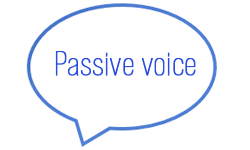
In academic writing, not only the content of your work is important, but also the style. Writing consistently and professionally can highly elevate your text and sometimes even improve your grade. Therefore, it is necessary to know every detail that could possibly advance your writing. Using the passive voice can often turn out to be rather tricky, which is why this article will explain it thoroughly, showing you how and when to use it.
Definition: Passive voice
The passive voice is a rearrangement of a sentence to introduce the former object as the grammatical subject and set the action itself into the spotlight. This way, the actual person or thing conducting an action shifts into the background. The reader’s attention is drawn to the act itself. Building passive sentences is rather easy, as you simply take your new subject, the corresponding form of to be and the past-tense verb to form the sentence. Sometimes you add the acting person at the end as a prepositional phrase.
Subject + Form of “to be” + Transitive verb in past participle + prepositional phrase (optional)
in Your Thesis
Active voice vs. Passive voice
It is crucial to know the difference between active voice and passive voice, as you cannot use passive voice in every situation. Especially in academic writing, many professors prefer the use of active voice. Differentiating the types of voice is in most cases rather easy. Just identify which element of the sentence is acting. If the person conducting the action is the grammatical subject of the sentence, it is active voice, if they are not mentioned or added as a prepositional phrase, it is passive voice. The following examples might help you get a better overview of this comparison.
Effect
Passive voice always draws the reader’s attention to the recipient of an action instead of the performer. However, this can risk losing clarity in what you are trying to explain and thus leads to a lack of information.
The sentence only states that Ellie was happy after receiving a letter, but we do not know who gave her the letter, revealing more about why she might be this happy.
While it states that the research was not valid enough to be valuable, there is nothing said about who deemed the study not representative. By this, you could mean yourself as you were selecting sources for your work, but it could also mean scholars, critics or just the opinion of the public. In a case like this, it would be necessary to clarify who deemed the study invalid to be taken seriously and prevent the suspicion of prejudice.
When to avoid passive voice
In academic writing, it is often best to avoid passive voice as much as possible, as it is too vague about who is acting. In research, however, the scientists conducting experiments and studies are important and need to be mentioned. Many students use passive voice to cover for holes in their research, which the writing instructors will, of course, take notice of. Furthermore, passive voice lengthens sentences and makes them harder to read, both things being not ideal for your thesis or text.
When to use
While there are many cases, especially in scientific writing, where it is better to avoid passive voice, there are also a few situations where it is acceptable or even necessary.
- The actor is unknown, which happens for example in crime reports. When something was stolen from you, and you do not know who the culprit is, you just report what was stolen.
- The actor is irrelevant, for example when the action is the only relevant information.
- You want to be vague about the actor, for example, to avoid blame or criticism.
- General rules that rely on common sense or ideals instead of a specific person.
- If you intend to emphasize the recipient instead of the actor.
- Lab reports are mostly written in passive voice, as the instructors prefer if you do not mention yourself in them. Instead, you only describe which experiment was conducted and what resulted from it.
FAQs
The passive voice is a rearrangement of a sentence, so the acting person is no longer the subject. This leads to the action and its recipient stepping into the foreground.
Active voice: She was washing the dishes.
Passive voice: The dished were washed (by her).
The passive voice directs the reader’s attention toward the action and the recipient of it.
Generally, it is best to avoid passive voice in academic writing because it lengthens sentences and complicates them. However, there are a few cases, where passive voice can or even has to be used, which you can find in this article about passive voice.
An example for a sentence written in passive voice could be: The party was organised two days earlier in order to finish all preparations on time.